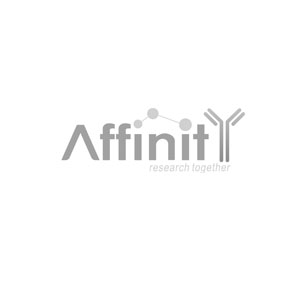C14orf39 Antibody - #DF12863
| Product: | C14orf39 Antibody |
| Catalog: | DF12863 |
| Description: | Rabbit polyclonal antibody to C14orf39 |
| Application: | WB IHC |
| Reactivity: | Human, Mouse |
| Mol.Wt.: | 50 kDa; 68kD(Calculated). |
| Uniprot: | Q8N1H7 |
| RRID: | AB_2845824 |
Related Downloads
Protocols
Product Info
*The optimal dilutions should be determined by the end user.
*Tips:
WB: For western blot detection of denatured protein samples. IHC: For immunohistochemical detection of paraffin sections (IHC-p) or frozen sections (IHC-f) of tissue samples. IF/ICC: For immunofluorescence detection of cell samples. ELISA(peptide): For ELISA detection of antigenic peptide.
Cite Format: Affinity Biosciences Cat# DF12863, RRID:AB_2845824.
Fold/Unfold
C14orf39; Chromosome 14 open reading frame 39; Protein SIX6OS1; S6OS1_HUMAN; Six6 opposite strand transcript 1; Six6os1;
Immunogens
- Q8N1H7 S6OS1_HUMAN:
- Protein BLAST With
- NCBI/
- ExPASy/
- Uniprot
MNDSLFVSLDRLLLEFVFQYEQDISTKEEMIQRINKCCEDIKENKVTICRIHETINATDEEIDHYCKHSEEIKDNCRNWKPTCDVFRKHEDYMQDQFTVYQGTVEKDKEMYHDYICQYKEVLKQYQLKYSETPFSREYYEKKREHEEIQSRVLACTEQLKMNETIFMKFRVPAPFPSLTKWTLNIVNLRCETQDILKHASNLTKSSSELKKEVDEMEIEINYLNQQISRHNETKALSETLEEKNKNTENRKELKERIFGKDEHVLTLNKTQSSQLFLPYESQKLVRPIKMHSSEPRVADIKEESSAKQSKLANIDFRQKENDTQIFNDSAVDNHSKCSHITTITSSQKFMQVRLLTPQKQSNSNQWSEKGDKDAEYGDKGTVRQVRESKCTSQAIYTEHFGKSVENDSDEVEERAENFPRTSEIPIFLGTPKAVKAPESLEKIKFPKTPPFEINRNRNAVPEVQTEKESPGLSFLMSYTSRSPGLNLFDSSVFDTEISSDQFNEHYSARNLNPLSSEQEIGNLLEKPEGEDGFTFSFPSDTSTHTFGAGKDDFSFPFSFGQGQNSIPSSSLKGFSSSSQNTTQFTFF
PTMs - Q8N1H7 As Substrate
| Site | PTM Type | Enzyme | Source |
|---|---|---|---|
| K80 | Ubiquitination | Uniprot | |
| Y129 | Phosphorylation | Uniprot | |
| Y139 | Phosphorylation | Uniprot | |
| T247 | Phosphorylation | Uniprot | |
| K283 | Acetylation | Uniprot | |
| T465 | Phosphorylation | Uniprot |
Research Backgrounds
Meiotic protein that localizes to the central element of the synaptonemal complex and is required for chromosome synapsis during meiotic recombination. Required for the appropriate processing of intermediate recombination nodules before crossover formation.
Chromosome.
Note: Component of the central element of the synaptonemal complex. In spermatocytes, detected from zygonema to pachynema and localizes along synapsed lateral elements. Loading to the central element of the synaptonemal complex is dependent on the assembly of the tripartite synaptonemal complex structure that occurs upon synapsis between homologous chromosomes.
Highest expression in retina, skeletal muscle and colon.
Interacts with SYCE1. Interacts with proteasome subunit PSMA8; to participate in meiosis progression during spermatogenesis (By similarity).
Restrictive clause
Affinity Biosciences tests all products strictly. Citations are provided as a resource for additional applications that have not been validated by Affinity Biosciences. Please choose the appropriate format for each application and consult Materials and Methods sections for additional details about the use of any product in these publications.
For Research Use Only.
Not for use in diagnostic or therapeutic procedures. Not for resale. Not for distribution without written consent. Affinity Biosciences will not be held responsible for patent infringement or other violations that may occur with the use of our products. Affinity Biosciences, Affinity Biosciences Logo and all other trademarks are the property of Affinity Biosciences LTD.
